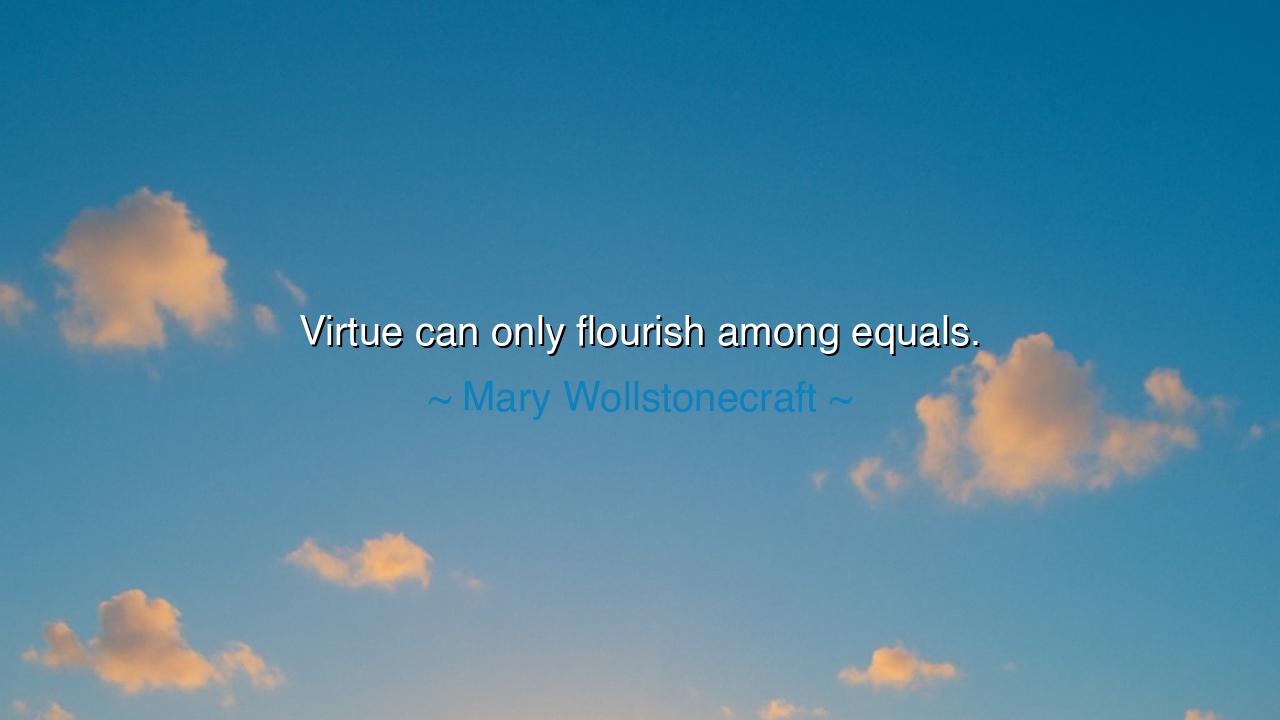
Virtue can only flourish among equals.






When Mary Wollstonecraft declared, “Virtue can only flourish among equals,” she was not merely writing about the rights of women — she was speaking to the moral foundation of all humanity. These words, born from the fierce clarity of her mind and the burning compassion of her soul, reveal a truth older than any empire: that goodness, justice, and virtue cannot take root where inequality poisons the soil. For virtue demands freedom — the freedom to choose rightly, to think clearly, and to act with dignity. And where one human is made to bow before another, the spirit that nurtures virtue withers.
In the style of the ancients, one might say: the gods themselves cannot plant righteousness in a land divided by domination. Equality is the light by which virtue grows; without it, morality becomes the privilege of the few and the burden of the many. Wollstonecraft, writing in the late 18th century — in her immortal A Vindication of the Rights of Woman — saw that the subjugation of women did not merely harm them, but corrupted the very moral order of society. When one half of humanity is silenced or diminished, the other half learns tyranny instead of justice. She understood that a nation cannot teach virtue while denying equality, for oppression breeds hypocrisy, not goodness.
The origin of this quote lies in the age of revolution — a time when France and America cried for liberty and the equality of men, yet forgot the equality of women. Wollstonecraft looked upon this contradiction and saw the flaw at the heart of human progress: that freedom declared for some but denied to others is no true freedom at all. Her words arose from both reason and pain — reason, for she saw that moral growth requires mutual respect; pain, for she lived in a world that denied her intellect, her independence, her voice. Through her pen, she built a temple of truth, proclaiming that virtue belongs to all, not to a chosen few crowned by birth or gender.
To understand her meaning, let us turn to the example of ancient Sparta and Athens. Sparta, though a land of warriors, gave its women strength, education, and voice, believing that a strong mother raises strong citizens. Athens, the cradle of philosophy, silenced its women, confining them to the shadows. And so it was that Sparta, for all its hardness, bred a fierce kind of civic virtue — loyalty, courage, and discipline shared among equals — while Athens, glorious in art but blind in justice, often betrayed its own ideals. Wollstonecraft’s wisdom would have seen this contrast clearly: virtue thrives not in hierarchy, but in the shared dignity of all who labor for the good.
Virtue, to Wollstonecraft, was not the cold obedience taught to the weak, but the living flame of moral freedom. She did not wish women to rule over men, nor men to kneel before women, but for both to walk side by side — as companions in reason, partners in virtue. For when equality exists, every act of goodness is born from choice, not coercion; every gesture of honor springs from understanding, not submission. She believed that moral excellence cannot be commanded — it must be cultivated in the fertile ground of respect and freedom.
History itself proves her right. Consider the abolition of slavery, that long struggle for equality of the human soul. When one man owned another, virtue was impossible — for the master’s heart grew proud, and the slave’s heart was chained. But when freedom triumphed, both were redeemed: the master by humility, the freed by dignity. Thus, as Wollstonecraft foresaw, virtue flourishes only among equals, because only among equals can the heart learn compassion, justice, and truth untainted by power.
The lesson she offers is eternal: no true goodness can exist where inequality remains. A society that prizes virtue must first tear down the walls that divide. In the home, let there be partnership, not domination. In the classroom, let every mind — male or female, rich or poor — rise to its fullest height. In the heart, let pride give way to understanding. For equality is not sameness; it is the recognition that every soul carries the same divine spark, and that each must be free to let it shine.
So, remember her words as a torch for all ages: virtue can only flourish among equals. When you seek to build goodness, begin by building fairness. When you dream of a noble world, dream first of a just one. For a world of hierarchy may achieve greatness in stone and sword, but only a world of equals will achieve greatness of the spirit — where virtue, unchained at last, can rise like the morning sun upon all humanity.






AAdministratorAdministrator
Welcome, honored guests. Please leave a comment, we will respond soon